
Karl Farkas was an Austrian actor and cabaret performer.

Fritz Eckhardt was an Austrian actor, director, and writer. He is remembered for playing the lead role as chief inspector Marek in the Österreichischer Rundfunk version of the detective series Tatort. He also played cabaret and wrote numerous theatre plays and film scripts.
The Woman Who Did is a 1925 German silent drama film directed by Benjamin Christensen and starring Lionel Barrymore, Gustav Fröhlich and Alexandra Sorina. It was an adaptation of the 1895 British novel The Woman Who Did by Grant Allen. The film's art direction was by Hans Jacoby.
Gerhard Max Richard Bienert was a German stage and film actor.
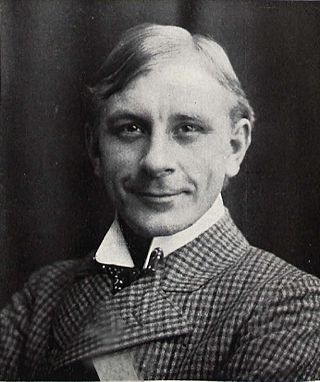
Karl Platen was a German actor and cinematographer known for Girl in the Moon (1929) and M (1931).
Klaus Pohl was an Austrian stage and film actor.

Stolen Identity is a 1953 Austrian film directed by Gunther von Fritsch and starring Donald Buka, Joan Camden and Francis Lederer.
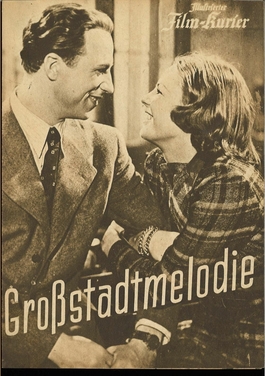
Melody of a Great City is a 1943 musical drama film directed by Wolfgang Liebeneiner and starring Hilde Krahl, Werner Hinz and Karl John. A young woman moves to Berlin to work as a press photographer.

By a Silken Thread is a 1938 German drama film directed by Robert A. Stemmle and starring Willy Fritsch, Carl Kuhlmann and Käthe von Nagy. The film was intended to be an exposure of "crooked Jewish capitalists" in line with Nazi racial policy of the era. It was shot at the Babelsberg Studios of UFA in Potsdam. The film's sets were designed by the art director Otto Hunte.

Back Then is a 1943 German drama film directed by Rolf Hansen and starring Zarah Leander, Hans Stüwe, and Rossano Brazzi. The film's sets were designed by Walter Haag. It was made at the Babelsberg Studio, by Universum Film AG, Germany's largest film company. It was Leander's final film of the Nazi era, as she returned to Sweden shortly afterwards. This was a blow for the German film industry, as she was the most popular and highest-paid star. Leander's next film was not for another seven years, when she made a comeback in Gabriela (1950).

The Merry Farmer is a 1951 Austrian musical comedy film directed by Georg Marischka and starring Paul Hörbiger, Erich Auer, Heinrich Gretler. An operetta film, it is an adaptation of the 1907 operetta The Merry Farmer composed by Leo Fall.

House of Life is a 1952 West German drama film directed by Karl Hartl and starring Gustav Fröhlich, Cornell Borchers and Edith Mill. The film's setting is a maternity hospital, portraying the stories of various staff and patients.

Call Over the Air is a 1951 Austrian drama film directed by Georg C. Klaren and Georg Wilhelm Pabst and starring Oskar Werner, Lucia Scharf and Fritz Imhoff.
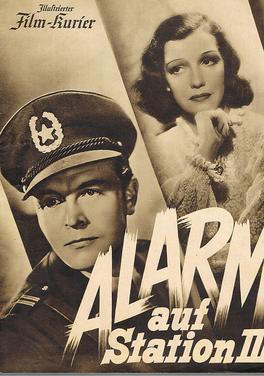
Alarm at Station III is a 1939 German crime film directed by Philipp Lothar Mayring and starring Gustav Fröhlich, Jutta Freybe and Kirsten Heiberg. It is set in a Scandinavian country with Prohibition.

Dangerous Game is a 1937 German comedy film directed by Erich Engel and starring Jenny Jugo, Harry Liedtke and Karl Martell.

Grandstand for General Staff is a 1953 Austrian comedy film directed by Ernst Marischka and starring Annemarie Düringer, Adrienne Gessner and Hans Holt.

Counterfeiters is a 1940 German crime film directed by Hermann Pfeiffer and starring Kirsten Heiberg, Rudolf Fernau and Karin Himboldt.
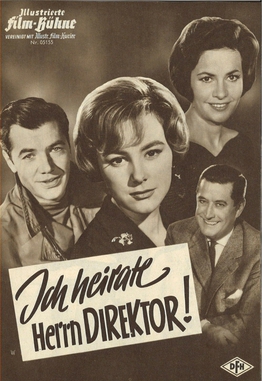
I'm Marrying the Director is a 1960 Austrian comedy film directed by Wolfgang Liebeneiner and starring Heidelinde Weis, Gerhard Riedmann and Hans Söhnker.
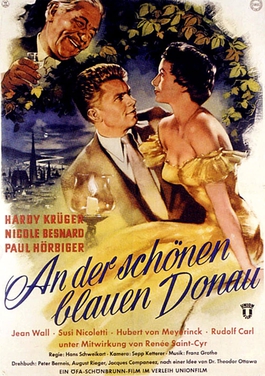
The Blue Danube is a 1955 Austrian romantic comedy film directed by Hans Schweikart and starring Hardy Krüger, Nicole Besnard and Paul Hörbiger. It was shot at the Schönbrunn Studios in Vienna and on location around the city. The film's sets were designed by the art director Fritz Jüptner-Jonstorff.

Royal Hunt in Ischl is a 1955 Austrian-West German historical comedy film directed by Hans Schott-Schöbinger and starring Elma Karlowa, Herta Staal and Hans von Borsody. It is also known by its West German title Two Hearts and a Throne. It was shot at the Sievering Studios in Vienna and on location in the Dachstein Mountains, Hallstatt and Gosau. The film's sets were designed by the art directors Hertha Hareiter and Otto Pischinger.

















